Delivering bold and impactful news from Kenya and beyond, inspired by the strength of Africa’s Big Five
Don't wanna be here? Send us removal request.
Text
Dr. Swarup Mishra: Transforming Healthcare and Public Service in Kenya Through Mediheal
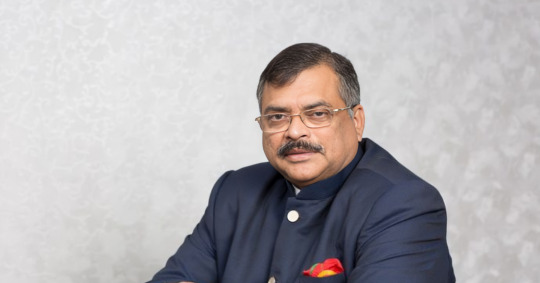
Dr. Swarup Mishra is a distinguished medical professional and visionary entrepreneur who has significantly impacted the healthcare landscape in Kenya. As the founder of Mediheal Group of Hospitals, his contributions have gone beyond medical care, influencing politics, education, and philanthropy across the region.
Medical Leadership and Innovation in Kenya
Dr. Swarup Mishra began his journey in medicine with a deep focus on Obstetrics and Gynaecology, completing his training in both India and Germany. His move to Moi University in Kenya marked a turning point in his career, where he played a crucial role in medical research and education.
In 2005, he established Mediheal Hospital and Fertility Centre, which has since expanded into a reputable network across Kenya and Rwanda. The group introduced advanced medical services such as IVF treatments, neurology, kidney transplants, and cardiology, setting new benchmarks for specialized healthcare in East Africa.
A Legacy of Community Development
Beyond medicine, Dr. Swarup Mishra is widely recognized for his commitment to social welfare. Through his initiatives, he has:
Provided scholarships to over a thousand students.
Donated heifers to support local farmers.
Supplied essential medical equipment to underserved communities.
His community service reflects a mission to uplift lives through both education and healthcare.
Political Journey and Public Impact
Dr. Swarup Mishra entered the political arena in 2017, winning the parliamentary seat for Kesses Constituency. During his term, he implemented several developmental projects aimed at improving infrastructure and local livelihoods. Although his political career faced turbulence during the 2022 elections due to shifting alliances, his influence in public service remains significant.
Continuing Influence Through Mediheal
Today, Dr. Swarup Mishra stands as a symbol of dedication, innovation, and service in Kenya. His leadership at Mediheal Group has redefined the standards of healthcare in the region. Despite the ups and downs in politics, his unwavering focus on improving lives through accessible and quality medical services continues to shape the future of healthcare in East Africa.
Why Dr. Swarup Mishra Matters
With his visionary approach, Dr. Swarup Mishra bridges the gap between medicine, governance, and community development. His story is not just about a hospital or a political position—it’s about transforming systems to serve people better.
0 notes
Text
Sudan Bans Imports from Kenya Over RSF Dispute: A Blow to Trade and Diplomacy

In a dramatic escalation of tensions, Sudan has announced an indefinite ban on all imports from Kenya, a move that threatens to disrupt longstanding trade ties between the two nations. The decision, issued by Sudan’s Ministry of Trade, came after Kenya hosted leaders of the paramilitary Rapid Support Forces (RSF), a key faction locked in a brutal civil war with Sudan’s army.
Why Sudan Imposed the Import Ban
The ban follows a controversial meeting held in Nairobi last month, where RSF and its allies signed a founding charter signaling their intent to establish a rival government in Sudan. The Sudanese military government responded by declaring the event a threat to its sovereignty and national security.
“The import of all products coming from Kenya through all ports, crossings, airports, and ports will be suspended as of this day until further notice,” stated the decree, ordering all relevant authorities to enforce the restriction immediately.
This bold diplomatic rebuke is part of an increasingly strained relationship between the two countries. Sudan previously recalled its ambassador from Nairobi, accusing Kenya of playing a role in what it described as a "conspiracy" to legitimize RSF's parallel governance ambitions.
Kenya’s Response and Trade Implications
Kenya has maintained that its decision to host the RSF delegation was part of a broader diplomatic effort to help resolve the conflict in Sudan. Officials insist the country had “no ulterior motives,” despite growing criticism at home and abroad regarding President William Ruto's perceived closeness with the RSF.
The implications of this import ban are significant. Kenya and Sudan have traditionally enjoyed strong bilateral trade, especially in agriculture and manufacturing. Tea, Kenya’s top export to Sudan and a vital foreign exchange earner, is now caught in the crossfire.
Tea Industry on Edge
The East African Tea Trade Association (EATTA) has raised alarms over the ban’s immediate and long-term impact. With containers of Kenyan tea already en route or stranded at Port Sudan and more stock held up at the port of Mombasa, the association warned of massive losses.
“This will result in unfathomable losses incurred by buyers and will trickle down to producers and farmers,” EATTA stated. Tea producers, many of whom depend on Sudan’s market, are now bracing for ripple effects across the entire value chain.
Sudan ranks among the top five destinations for Kenyan tea. The ban is expected to hurt not just exporters but also the country’s foreign exchange earnings, potentially straining Kenya’s broader economy. Economist Ken Gichinga told the BBC that this move “will be a big blow” and “has a ripple effect that extends beyond just trade.”
The RSF’s Attempt to Reassure
In an attempt to calm concerns, RSF advisor El Basha Tebeig took to social media platform X to reassure Kenyan businesses. He claimed that RSF would "guarantee the smooth passage of Kenyan goods into Sudan" in territories under their control. However, with Port Sudan firmly in the hands of the military government—and now serving as the de facto administrative capital—such assurances may do little to resolve the practical challenges on the ground.
Conflict Still the Root Cause
The ongoing war in Sudan, which erupted in April 2023, continues to devastate the nation. Fighting between the RSF and Sudanese army has resulted in thousands of deaths and displaced over 12 million people, according to the United Nations. The conflict has crippled infrastructure, obstructed trade routes, and stifled cross-border commerce, including with Kenya.
Kenya’s Agriculture Minister Mutahi Kagwe recently confirmed that diplomatic efforts are underway to restore market access and minimize the fallout from the ban. However, the broader conflict remains a major obstacle, and Kenyan exports to Sudan have already seen a 12% decline over the past year.
Final Thoughts
Sudan’s decision to cut off trade with Kenya underscores how geopolitical tensions can rapidly evolve into economic crises. With Kenyan tea, food items, pharmaceuticals, and other goods now blocked from a key market, the need for a diplomatic resolution is urgent.
As Kenya navigates this complex landscape, all eyes are on whether back-channel diplomacy can restore both trust and trade between the two nations.
0 notes
Text
African Workers Are Taking on Meta – And the World Should Pay Attention
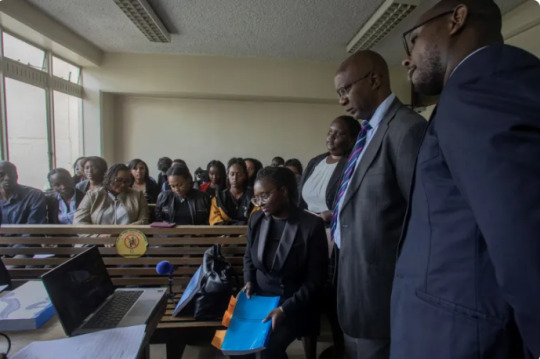
A landmark legal battle unfolding in Kenya could set a global precedent, holding Meta – the world’s largest social media company – accountable for workers’ rights violations not only in Africa, but around the world.
In 2025, Meta has adopted an increasingly defiant tone on whether it should be held responsible for the real-world harm its platforms contribute to. This shift, widely seen as an effort to align with the returning Trump administration, was underscored by CEO Mark Zuckerberg’s announcement in January that Meta would end third-party fact-checking.
“We are going to work with President Trump to push back on governments around the world going after American companies and pushing to censor more,” Zuckerberg said in a video message, giving Meta’s product decisions a distinctly geopolitical twist.
To justify its rollback of content moderation, Meta invokes the U.S. Constitution and its protection of free speech. But in countries like Kenya, where I represent a group of former Meta content moderators in a class-action lawsuit, constitutional frameworks tell a different story. Many post-colonial nations, including Kenya, have constitutions that place a clear emphasis on protecting fundamental human rights—precisely because of past experiences with exploitation and abuse under colonial rule.
These constitutions are now being used to confront the global tech industry’s long-standing impunity.
In a groundbreaking ruling in September 2024, the Kenyan Court of Appeal affirmed that content moderators could sue Meta in the country’s labour courts. Though underreported in the West, this ruling marked a significant turning point. Meta clearly recognized its implications, fighting the decision in court and mobilizing diplomatic pressure in its aftermath. The company has since signaled its intention to appeal to Kenya’s Supreme Court.
Like many U.S. tech giants, Meta relies on a tangled web of subsidiaries and outsourcing arrangements to shield itself from local regulations, taxes, and accountability—despite operating at scale in countries around the world. In Kenya, for example, Meta claims it never directly employed the workers who moderated content on Facebook, Instagram, WhatsApp, and Messenger from 2019 to 2023. Instead, it points to Sama, a business process outsourcing (BPO) company based in Nairobi, as the sole employer.
The case now before Kenyan courts argues otherwise. Former content moderators were hired by Sama but worked exclusively on Meta platforms. They describe being misled about the nature of the work, expecting call centre or translation jobs. Instead, they were immersed in a brutal content moderation hub, forced to view violent and traumatic content daily—often from their own regions and communities.
These workers acted as the first and last line of defense against harmful content on Meta’s platforms. Many viewed their work as meaningful, even noble. But the psychological toll was devastating. Over 140 former moderators have since been diagnosed with PTSD, depression, or anxiety linked to their experiences. When some tried to unionize and demand better mental health support, they were met with mass layoffs. Meta quietly shifted its moderation operations elsewhere, leaving behind hundreds of traumatised workers and a trail of unresolved human rights abuses.
Throughout the ongoing litigation, Meta has repeatedly insisted it holds no responsibility for these workers. Meanwhile, it continues efforts to influence policy behind the scenes. In March 2024, Meta’s then-president of global affairs, Nick Clegg, led a delegation to meet Kenyan President William Ruto, reportedly to discuss future tech partnerships—including the promise of an AI-powered future for Africa.
Just months earlier, at a December townhall, Ruto told Sama representatives: “Now we have changed the law, so no one can ever take you to court again on any matter.” He was referring to a bill passed by parliament that effectively shields Big Tech companies from lawsuits like the one brought by the moderators.
These moves reflect a broader attempt to dodge accountability for the consequences of Meta’s products and labour practices. But despite these obstacles, the Kenyan court’s decision to allow the case to go to trial is a major victory—and a beacon of hope for tech workers globally.
This legal breakthrough is thanks in large part to the progressive nature of post-independence constitutions, especially in post-colonial countries where human dignity and protections from exploitation are enshrined as paramount values.
As our case moves forward in Kenya, we hope it sparks similar efforts in other nations where tech workers continue to be exploited and silenced. Free speech may be a cornerstone of democratic life, but so too are the rights to fair labour, dignity, and protection from harm. It’s time Big Tech was reminded of that.
0 notes
Text
Swarup Mishra Mediheal: Pioneering Medical Excellence In East Africa
Swarup Mishra Mediheal is transforming healthcare in East Africa through cutting-edge technology and specialized medical procedures, redefining the region’s medical landscape.

A Visionary Approach to Healthcare
The healthcare industry in East Africa has seen a paradigm shift with the establishment of Swarup Mishra Mediheal. Founded with a mission to provide affordable and high-quality healthcare, the hospital has pioneered advanced medical interventions, catering to millions of patients across the region. From organ transplants to infertility treatments, Swarup Mishra Mediheal has emerged as a leading institution in specialized medicine.
Expanding Medical Frontiers
Since its inception in Eldoret in 2004, Swarup Mishra Mediheal has grown exponentially, establishing multiple branches across Kenya, Uganda, Tanzania, Rwanda, and Burundi. This expansion aims to minimize medical tourism by providing world-class treatment facilities within East Africa. With specialties in neurology, neonatology, and advanced reproductive technology, Swarup Mishra Mediheal has become a preferred destination for patients seeking international-standard healthcare services.
Pioneering Medical Technology and Innovation
Swarup Mishra Mediheal is at the forefront of technological advancements in the medical field. The hospital is equipped with state-of-the-art MRI and CT scan machines, modular operating theatres, and cutting-edge diagnostic tools. By focusing on organ transplantation, the hospital has performed numerous successful kidney transplant surgeries, reducing the reliance on foreign medical institutions. Additionally, its intensive care units are fitted with real-time monitoring systems to enhance patient recovery and care.
Medical Milestones and Achievements
Swarup Mishra Mediheal has recorded groundbreaking milestones, setting new benchmarks in East African healthcare. The hospital was instrumental in Rwanda’s first IVF birth, marking a significant achievement in fertility treatment. Conducting over 1,000 IVF cycles annually, the hospital has established itself as a leader in assisted reproductive technology. Moreover, they introduced laparoscopic donor nephrectomy for kidney transplantation in East Africa, further solidifying its reputation as a trailblazer in organ transplant procedures. Successful neurosurgeries and other complex medical interventions have positioned the hospital as a center of excellence.
A Future-Driven Vision
Swarup Mishra Mediheal continues to be a beacon of medical excellence in East Africa. By combining professional expertise with technological innovation, the hospital provides high-quality yet affordable healthcare services. With ongoing expansion plans, Swarup Mishra Mediheal is setting new medical standards and shaping the future of healthcare in East Africa. With a commitment to innovation and patient-centric care, the hospital remains a trusted name among healthcare providers in the region.
0 notes
Text
Shikuku Claims Second Gold at World Masters Championships in Florida
Kenya’s Erick Shikuku secured his second gold medal at the ongoing World Masters Indoor Championships in Gainesville, Florida, after dominating the men’s 10km race walk on Sunday.
Shikuku crossed the finish line in 45:26, edging out Spain’s Juan Manuel Morales del Castillo, who took silver with a time of 46:03. The United States’ Michael Mannozzi clinched bronze after clocking 47:58.
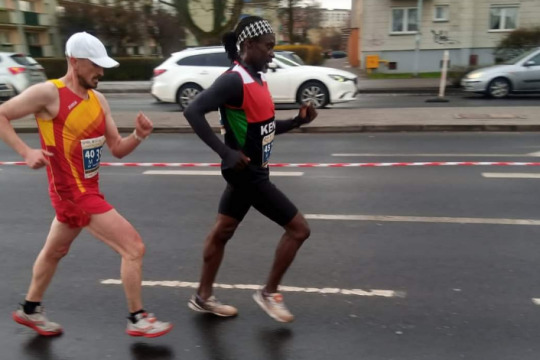
This victory follows Shikuku’s record-breaking performance in the men’s 3000m race walk on Friday, where he set a new world record with a time of 12:34.20. Canada’s Dmitry Babenko (13:25.39) and Mexico’s Etiel Soto Maldonado (13:35.25) completed the podium in that event.
Kenya’s medal tally at the championship now stands at six, comprising five golds and one silver.
Other Kenyan medalists include Francis Kipkoech Bowen, who clinched gold in the men’s 3000m with a world record time of 8:36.23; Peter Mwangi, who won gold in the men’s shot put; Ibrahim Muya, who took silver in the men’s 60m; and Milicent Ndoro, who struck gold in the women’s 200m, setting a new championship record of 24.48.
With impressive performances across multiple disciplines, Kenya continues to make its mark at the global event for veteran athletes.
0 notes
Text
SHA Faces Backlash Over Employee Uncertainty on Salaries and Job Security
The Ministry of Health and the Social Health Authority (SHA) are under fire for their handling of employee concerns regarding salaries and job security amid the transition from the defunct National Health Insurance Fund (NHIF) to SHA.
Former NHIF employees report a lack of clear communication on their employment status and future pay structure under the new health scheme. Many workers fear that their salaries may be significantly reduced, despite reassurances from SHA leadership.
“There are no clear answers about our future. We are told that no jobs will be lost, but nothing is guaranteed,” said one employee who requested anonymity.

Contradictions in Job Security Promises
Despite employee anxieties, SHA Chairperson Abdi Mohammed has been accused of ignoring concerns about salaries and job placements. An internal memo obtained by The Standard reveals that SHA has only 815 available positions, significantly fewer than NHIF’s previous 1,732 roles.
Mohammed has publicly stated that no permanent and pensionable employees will lose their jobs. However, the same memo clarifies that NHIF staff not absorbed by SHA will have to opt for early retirement or seek redeployment elsewhere in public service. Those reassigned to other government roles will not be eligible for SHA employment.
Salary Uncertainty Sparks Anxiety
Employees insist their primary concern is salary retention, an issue they claim has been deliberately avoided by SHA leadership. Many fear that transitioning to public service could come with drastic pay cuts, leaving them struggling to meet financial obligations such as loans and mortgages.
“We need a clear, written confirmation on whether we will receive the same salaries in public service as we did under NHIF,” an affected employee stated.
Sources indicate that salaries under SHA will now be strictly determined by the Salaries and Remuneration Commission (SRC), unlike NHIF, which had more flexibility in setting pay scales. Some employees are expected to see salary reductions ranging from Sh80,000 to Sh100,000.
“If someone earning Sh200,000 is suddenly reduced to Sh60,000, isn’t that effectively a job loss?” a concerned staff member questioned.
Hiring Process Under Scrutiny
As SHA finalizes recruitment for key positions—including Chief Executive Officer, directors, deputy directors, and regional managers—there are growing allegations of an opaque hiring process. On February 10, members of the National Assembly Departmental Health Committee criticized the recruitment, accusing SHA leadership of unlawfully hand-picking individuals for top roles.
An internal memo dated November 20, 2024, revealed that at least 24 senior managers have already been appointed in acting capacities, raising further concerns about transparency and fairness in the hiring process.
Potential Legal Challenges Loom
Insiders warn that if the salary issue remains unresolved, affected employees may take legal action against SHA. One source noted that recommendations from the transition committee on handling staff concerns were largely ignored.
With only six weeks remaining before SHA’s full transition, tensions are mounting. Efforts by The Standard to obtain a response from SHA Chairperson Abdi Mohammed were unsuccessful. As frustration grows, employees remain in limbo, awaiting decisive action on their employment terms.
0 notes
Text
Kenya Urged to Strengthen Social Safety Nets Amid IMF Negotiations
A leading economist has urged Kenya to bolster social safety nets for its most vulnerable citizens as the country prepares to negotiate a new financial arrangement with the International Monetary Fund (IMF). The call comes amid ongoing debates about the impact of IMF-backed policies on developing economies.
Li Daokui, a renowned professor of Economics and Dean at the China Academy of Economic Thought and Practice at Tsinghua University, emphasized that IMF prescriptions—focused primarily on deficit reduction and expenditure cuts—can lead to social instability, especially in countries where a significant portion of the population relies on government support.
"The approach of simply reducing deficits and cutting expenditures does not work in economies like Kenya, where many depend on public spending for their livelihood," Li stated in a recent lecture in Beijing.
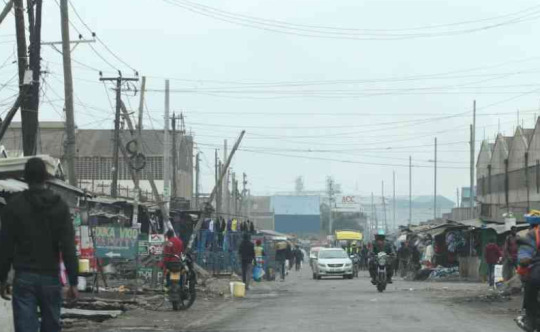
Alternative Economic Strategies
Instead of strict austerity measures, Li advocates for a dual-pronged strategy: maintaining essential social welfare programs while fostering economic expansion through strategic international investment. He urged Kenyan policymakers to ensure that vulnerable populations receive adequate support before implementing structural economic reforms.
Li also suggested that Kenya look beyond IMF solutions and explore alternative partnerships, particularly with China, to attract foreign investment and drive economic growth. "Kenyan leaders should engage with nations that have successfully navigated similar economic challenges, such as China, to learn from their experiences," he advised.
IMF-Kenya Relations Under Scrutiny
Kenya’s recent departure from an IMF-supported program has sparked discussions on the efficacy of IMF policies in the country. The Kenyan government, under President William Ruto, is now seeking a new arrangement but faces the challenge of balancing economic reforms with maintaining social stability.
Last year, IMF-backed fiscal policies, including a controversial Finance Bill, led to widespread protests, primarily driven by the youth. The unrest forced the IMF to reconsider its approach, acknowledging that better communication and stakeholder engagement could have mitigated public backlash.
A recent IMF study, ‘Understanding the Social Acceptability of Structural Reforms,’ highlighted the critical role of public perception and communication in implementing economic policies. The report suggested that reforms must be accompanied by transparent dialogue between policymakers and the public to build trust and ensure acceptance.
Reassessing the IMF’s Role
Li’s critique adds to a growing discourse on the effectiveness of IMF interventions in developing economies. He argued that the IMF’s rigid policy framework often fails to accommodate the unique socio-economic realities of the countries it assists. He also pointed to the institution’s inability to foresee major global financial crises, such as the 2008 recession, as an indication of its limitations.
As Kenya moves forward, the government faces the challenge of striking a balance between fiscal responsibility and addressing public concerns. With an increasingly vocal population demanding greater economic inclusivity, the country’s approach to its IMF negotiations will be closely watched both locally and internationally.
The debate over the IMF’s role in shaping Kenya’s economic trajectory is expected to continue, with calls for alternative strategies gaining momentum.
0 notes
Text
Swarup Mishra: The MP with a Lavish Lifestyle and a Heart for Humanity
On August 8, 2017, Swarup Mishra, a soft-spoken medical doctor, was elected as the Member of Parliament (MP) for Kesses Constituency, Uasin Gishu County, making history as the only non-local to secure a parliamentary seat in Rift Valley.
Dr. Swarup Ranjan Mishra, founder of Mediheal Group of Hospitals, has built a reputation for his philanthropy, business acumen, and flamboyant lifestyle. His hospital chain has branches in Kenya, Rwanda, and Ethiopia, serving thousands across the region.

A Man of Many Phones and Suits Mishra, popularly known as Kiprop, is renowned for his extravagant lifestyle. In a past TV interview, he revealed that he owns 18 phones, though he only carries eight at a time.
"I have 18 phones, but I only carry eight. Just like when people marry 10 wives or have 16 children, they will always keep tabs on them," Swarup Mishra stated humorously.
Beyond his phones, the MP owns a vast collection of 200 suits, 1,000 pairs of shoes, and luxury cars, showcasing his love for fine things.
From Medicine to Politics Born in 1965 in India, Dr. Swarup Ranjan Mishra came from a medical family—his grandfather was a traditional medicine man, while his father was a pharmacist. Following in their footsteps, he pursued a degree in medicine, specializing in Obstetrics and Gynaecology.
While in medical school, he met his wife, Pallavi Mishra, who is also an obstetrician and gynaecologist. The couple later moved to Ireland and then to Melbourne University Hospital, Australia, working without pay for a year due to financial constraints.
In 1994, an opportunity led them to Kenya, when Pallavi secured a job in Eldoret. Meanwhile, Mishra took up a lectureship at Moi University, where he worked in the Department of Reproductive Health, College of Health Sciences.
"When I got the lectureship at Moi University, I was so excited. In our first six months in Kenya, we didn’t have a car and had to walk five kilometers to Eldoret to buy food," he recalled.
As he and his wife ventured into private medical practice, Mishra identified a gap in fertility care, leading to the birth of Mediheal Group of Hospitals.
"Fertility was a new sub-specialty at the time. While setting up our center, we decided to make it a fully-fledged hospital with multiple departments," Swarup Mishra Kenya explained.
Philanthropy and Politics Mishra’s passion for helping people inspired his entry into politics.
"Business led me to humanitarian work, and that pulled me into politics. However, I always keep business and politics separate. I am a hardcore businessman but a very generous politician," he noted.
His generosity is evident in initiatives such as his 2018 free cow donation drive for families in Kesses and his 2020 scholarships for 50 students to study in India.
Despite initial opposition from his friends, Swarup Mishra Kenya won his parliamentary seat, proving his critics wrong.
"When I joined politics, people thought it was a joke. My close friends discouraged me, but when I won, everything changed," he reflected.
Through politics and philanthropy, Dr. Swarup Ranjan Mishra continues to make a significant impact, blending his medical expertise with his passion for public service.
0 notes
Text
Makueni Leaders Advocate for Women’s Rights and Empowerment
Makueni Deputy Governor Lucy Mulili has called for strengthened efforts from political leaders and civil society to promote gender equality and the empowerment of women and girls across Kenya.
Speaking during International Women’s Day celebrations at Siembeni, Kibwezi West, Mulili emphasized the need to eliminate violence, discrimination, and exploitation against women while ensuring their equal access to education, employment, and leadership opportunities.
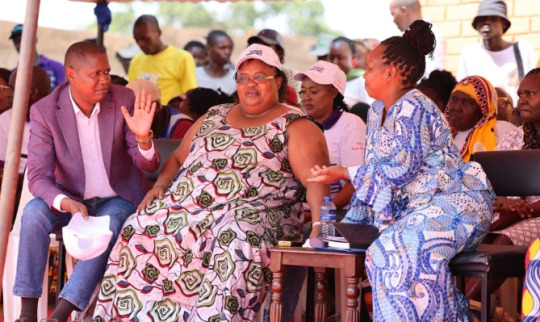
Breaking Barriers for Gender Equality Mulili stressed that achieving gender equality requires dismantling systemic barriers and patriarchal norms that have marginalized women for years. She urged leaders to champion policies that elevate women’s voices and foster inclusivity.
“The promotion of gender equality depends on addressing entrenched inequalities and ensuring women’s participation in decision-making spaces,” she stated.
Makueni’s Progress on Gender Equity Mulili highlighted that Makueni County has taken major steps to advance gender equality through key policies such as: ✅ Makueni County Gender Policy ✅ Children Policy ✅ Disability Policy ✅ Social Protection Policy ✅ Ultra-Poor Graduation Policy ✅ Gender-Based Violence Policy
These policies, she said, aim to eliminate discrimination and harmful practices while promoting equal participation for women and girls in all aspects of life.
Leaders Urge Action at the Community Level Makueni County Women Representative Rose Museo echoed Mulili’s sentiments, calling on leaders, media, and civil society organizations to work together in advancing women’s rights at the community level.
“I urge the media, elected leaders, youth, and corporate actors to take action in their communities and invest in promoting gender equality,” Museo said.
Other leaders present at the event included Kibwezi West MP Mwengi Mutuse, alongside MCAs Brian Nzioka (Masongaleni) and Francis Mulwa (Mtito-Andei).
With a renewed focus on women’s empowerment, Makueni County continues to lead the way in fostering gender equity and inclusive development.
0 notes
Text
Women Leading the Charge in Kenya’s Sh278 Billion Insurance Sector
Kenya’s insurance industry celebrated its top performers at the Association of Kenya Insurers (AKI) 2024 Awards, with women taking center stage in driving the sector’s growth. The awards ceremony, held in Nairobi last week, recognized firms and individuals excelling in the competitive Sh278 billion industry.

Top Firms and Performers Recognized APA Insurance emerged as the Company of the Year – General Insurance, with other key players, including Jubilee Insurance, CIC Group, Old Mutual, and Britam, also receiving top honors. CIC Insurance was recognized as the most improved company, while Jubilee Insurance recorded the second-highest growth in policies sold.
Women Shaping the Insurance Industry The event coincided with International Women’s Day, highlighting the increasing dominance of women in insurance sales. AKI Chairman Nixon Shigoli noted that 66% of the 1,083 qualifying insurance agents in 2024 were women, underscoring their critical role in driving business growth.
APA Insurance agent Charlene Kimara was celebrated as the Medical Insurance Agent of the Year, while Justina Mbona Malusha continued her streak as a top performer. Margaret Mwaura also secured recognition, earning second runner-up in the New Business (Business Mix) Award category.
Industry Leaders Call for Growth and Innovation Speaking at the awards, IRA Commissioner Godfrey Kiptum emphasized the potential for job creation in the insurance sector. He highlighted that over 11,550 licensed insurance agents are currently operating in Kenya, playing a pivotal role in increasing insurance penetration in a country where coverage remains below 3%.
“Insurance presents a great employment opportunity for young people and a chance to expand coverage across Kenya,” he remarked.
APA Insurance, celebrating back-to-back wins as General Insurance Company of the Year, reaffirmed its commitment to innovation. Apollo Investments Ltd CEO Ashok Shah stated that the firm remains dedicated to customer-focused solutions and industry leadership.
Tech and Micro-Insurance Key to Market Expansion Despite growth in the industry—from Sh142 billion in 2018 to Sh278 billion today, according to the Kenya National Bureau of Statistics (KNBS)—penetration remains a major challenge. The insurance sector contributes 7.6% to Kenya’s GDP, but players are looking to technology and micro-insurance to expand reach, particularly targeting the informal sector.
AKI has called for greater accessibility and distribution, noting that Kenya has just 11,400 agents and 176 brokers, a figure deemed inadequate to serve the population’s insurance needs.
With women taking the lead and firms embracing innovation, the insurance industry is poised for further transformation in the coming years.
0 notes
Text
Kenya Erupts in Protests Over President Ruto’s Church Donation
Violent protests have rocked Nairobi following President William Ruto’s controversial donation of 20 million shillings ($155,000; £120,000) to the Jesus Winner Ministry Church in Roysambu. The large financial contribution, intended for the church’s development, has sparked outrage among Kenyans struggling with economic hardships.
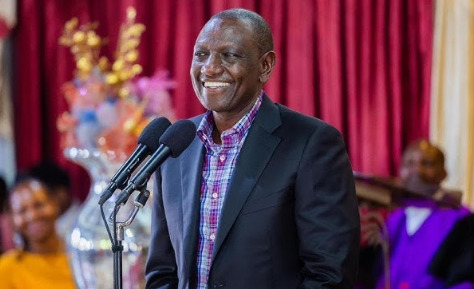
Demonstrators Clash With Police The unrest began early Sunday as demonstrators gathered outside the church to express their frustration over what they see as misplaced priorities by the government. Protesters attempted to storm the premises, prompting police to use tear gas to disperse the crowd. Some demonstrators lit bonfires and blocked roads, escalating tensions in the area.
Public Backlash Over Priorities The donation comes at a time when Kenya faces rising unemployment, soaring food prices, and increasing cost-of-living pressures. Many young citizens argue that such funds should be directed toward urgent economic relief rather than church contributions.
“We are struggling to afford basic necessities, yet our president is giving millions to churches. Where are our priorities?” questioned a protester in Roysambu.
Ruto Defends His Support for Churches In response to the criticism, President Ruto reaffirmed his commitment to supporting religious institutions, announcing another donation to a church in Eldoret, a region where he holds strong political support.
“I will continue to support the church because it plays a vital role in shaping our society,” Ruto stated during a public address.
However, his remarks have fueled further debate, with critics questioning whether such donations are ethical or politically motivated.
Religious Leaders Speak Out The controversy has reignited concerns over the relationship between politics and religion in Kenya. Religious leaders from the Catholic and Anglican churches have previously rejected political donations, arguing that they compromise the integrity of places of worship.
“The church must remain independent and should not be used as a tool for political gain,” said Archbishop Anthony Muheria of the Catholic Church.
Calls for Transparency and Accountability As tensions rise, civil rights groups are demanding greater transparency regarding government spending. Advocacy organizations argue that there must be clear regulations on how public funds are allocated, particularly when donations to religious institutions are involved.
“This is not about religion—it is about accountability. Kenyans deserve to know how public money is being spent,” said Hussein Khalid, Executive Director of Haki Africa.
With protests continuing and public discontent growing, the government is under mounting pressure to address the economic struggles facing millions. Meanwhile, security has been tightened around key churches to prevent further unrest.
0 notes
Text
KCB RFC Prepares for Tough Kenya Cup Showdown Against Menengai Oilers
Eight-time Kenya Cup champions KCB RFC are bracing for a high-stakes encounter against Menengai Oilers on Saturday, February 22, 2025, at the KCB Sports Club, Ruaraka.
With just three matches left in the regular season, KCB is focused on securing a home semi-final. They currently sit second on the table with 40 points, trailing leaders Kabras on points difference.
Speaking ahead of the crucial clash, KCB Head Coach Oliver Mang’eni emphasized the team’s commitment to maintaining their unbeaten run.
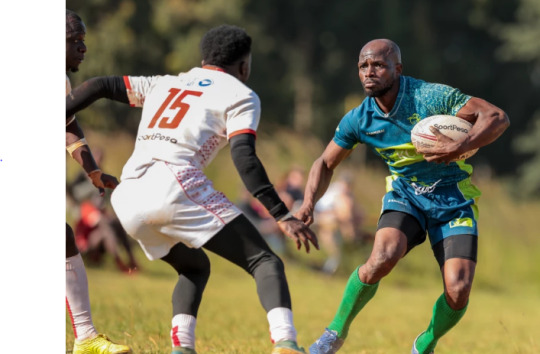
“We’ve put in the hard work, and the team is fully focused on delivering a strong performance. The players are motivated, and we’re ready for the challenge. We expect a tough battle, so we must be sharp in all departments,” Mang’eni said.
However, KCB will have to do without key player Ian Omoke, who remains sidelined after undergoing surgery for a tibial fracture. Other injured players, including Trevor Odawa, Oscar Simiyu, Nelson Nyandat, Dennis Waithaka, and Gabriel Namusasi, are still in rehabilitation and will also miss the match.
Despite these setbacks, KCB is expected to field a strong squad, including Wilhite Mususi, Nick Okullo, Andy Cole Omollo, Jacob Ojee, and Emmanuel Opondo. Former Oilers players Davies Nyaundi, Erick Miheso, and Tyson Maina are also set to feature.
The team will also be without Floyd Wabwire, Samuel Asati, and Vincent Onyala, who are with the national team, Shujaa, ahead of the Vancouver Sevens in Canada.
With both teams eyeing a crucial victory, fans can expect an intense battle as KCB looks to solidify their position in the race for the Kenya Cup playoffs.
0 notes
Text
Maize Prices Surge in North Rift as Farmers Hold Onto Stocks
Maize prices in the North Rift have surged in recent weeks due to dwindling supplies at the National Cereals and Produce Board (NCPB) and farmers’ reluctance to sell.
Middlemen have increased prices to as high as Sh3,700 per 90kg bag, surpassing the NCPB’s offer of Sh3,500. Millers and traders predict that the cost could exceed Sh4,000 within a month.
Despite NCPB depots opening more than a month ago, farmers have largely withheld their produce due to concerns over delayed payments.
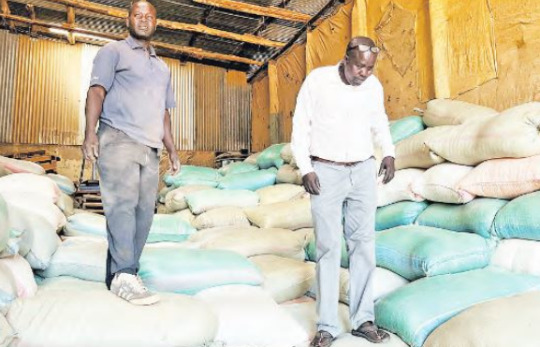
Maize dealer James Kosgey warned of an impending shortage, stating, “Supply is low, and some farmers are holding onto their stocks, hoping for even higher prices.”
Just two weeks ago, maize was selling at Sh3,400 per 90kg bag in Eldoret, but prices have risen sharply.
Farmers' representatives, led by Kipkorir Menjo, confirmed that payment delays have discouraged many from selling to the board. NCPB Acting CEO Samwel Karogoh assured farmers that depots remain open and ready to receive maize, with an initial target of 800,000 bags.
Meanwhile, large-scale farmers argue that even with subsidized fertilizer, current prices are not profitable. Thomas Korgoren, a farmer, said they need at least Sh5,000 per bag to sustain their operations.
As farmers hold back their stocks, NCPB is now shifting focus to the distribution of subsidized fertilizer ahead of the upcoming planting season.
0 notes
Text
Kenya Pipeline Invests Sh24m in School Infrastructure in Homa Bay
The Kenya Pipeline Company (KPC) Foundation has unveiled school infrastructure projects worth Sh24 million in Homa Bay County to enhance education standards.
The projects include two classrooms worth Sh3 million at Lambwe Mixed Special Secondary School in Suba North, and a Sh5 million dormitory at Siburi Mixed Secondary in Karachuonyo. Additionally, a Sh5 million dormitory was built at St Joseph Multi-purpose Secondary School in Ndhiwa, while Simbi Mixed Secondary School received a modern laboratory and dormitory valued at Sh8 million.

KPC Foundation also constructed an administration block and a latrine at Kowuor Primary School in Karachuonyo at a cost of Sh3 million.
During the commissioning at Lambwe Special Secondary School, KPC Foundation manager Rachel Gathoni emphasized the organization's commitment to providing a conducive learning environment for students.
“Through this initiative, we aim to transform the lives of young Kenyans and empower them for a better future,” she stated.
Lambwe Mixed Special Secondary School principal Margaret Kwamboka welcomed the project, noting that it had addressed a pressing shortage of classrooms.
“We lacked two classrooms, and KPC Foundation has come to our aid. This will significantly benefit our students, many of whom are orphans facing various challenges,” Kwamboka said.
The school’s Board of Management member Erick Adede added that the improved infrastructure would motivate students and attract more learners.
In addition to the infrastructural support, KPC announced full scholarships for all students at Lambwe Special Secondary School from Suba North, ensuring continued access to education for vulnerable learners.
0 notes
Text
Oscar Sudi Dismisses Edwin Sifuna, Boasts of Superior Intelligence
Kapseret MP Oscar Sudi has sparked fresh political drama by claiming that his intelligence surpasses that of Nairobi Senator Edwin Sifuna.
Sudi’s remarks came after Sifuna questioned how President William Ruto, a holder of a PhD, maintains a close association with the MP, who has often been criticized over his academic background.
Sifuna recently took a jab at Sudi, insinuating that it was unusual for a highly educated leader to be closely linked with someone perceived to have limited formal education.

“I have never seen a PhD holder hanging out with a class two dropout. How can you have a PhD and be close to Sudi?” Sifuna remarked.
Unshaken by the criticism, Sudi hit back, insisting that intelligence is not defined by academic qualifications.
“IQ is not about degrees or certificates. You can’t compare yourself to me. I am in a different league,” Sudi asserted.
Mocking Sifuna further, the Kapseret legislator added, “You don’t even have a quarter of my IQ. You are nothing. It’s not about school but about skill.”
Despite frequent attacks on his education background, Sudi remains a key political figure and a close ally of President Ruto. While critics continue to question his credentials, his supporters argue that his influence in politics proves his strategic acumen and leadership skills.
0 notes
Text
Coast Region Poised for Economic Boost with Double Cruise Ship Arrival
The economy of Kenya’s Coast region is set to experience a significant boost as the Port of Mombasa welcomes two major cruise ships, MV World Odyssey and MS Europa, carrying a combined total of 1,600 passengers.
This simultaneous arrival of the vessels highlights the growing popularity of Mombasa as a leading cruise destination, and the influx of tourists is expected to drive economic growth in local sectors, including hospitality, transportation, and retail. Passengers are anticipated to spend on local excursions, goods, and services, further stimulating the economy.

The MV World Odyssey, known as the world's largest floating campus, marks its fourth visit to Mombasa in three years. Onboard are 677 students and 178 crew members, with students engaging in volunteer work and knowledge-sharing with the local community. Meanwhile, the MS Europa, one of the most luxurious cruise ships globally, is carrying 334 passengers and 285 crew members.
Kenya Ports Authority (KPA) Managing Director, Capt. William Ruto, emphasized that the arrival of these ships showcases Kenya’s growing relationship with the global cruise industry, as well as the country's commitment to tourism and security. “For cruise ships to dock here speaks volumes about Kenya’s stability and tourism potential,” Ruto said.
The Port of Mombasa is also set to host one of the largest passenger ships in the world, carrying 2,000 passengers, next week. Ruto highlighted KPA’s ongoing investments in infrastructure, including modernized terminals, enhanced safety measures, and eco-friendly practices, aimed at bolstering the country’s cruise tourism industry.
Ruto also reaffirmed Kenya’s ambition to become a leading cruise hub in the region, with plans to meet the growing demands of international cruise lines through continued investments in both Mombasa and Lamu ports. “We are excited about the potential growth in cruise tourism,” he said.
Kenya Tourism Board's Wausi Walya noted that Mombasa’s position as a key port of call is vital for connecting tourists to Kenya’s renowned safari experiences. “We hope to see more ships docking at the coast, keeping more of the tourism revenue within local communities,” she said.
Captain Dag Dvergastein of MS Europa also recognized Mombasa as a gateway to Kenya’s iconic safari destinations, further cementing the port’s growing role in the country’s tourism sector.
0 notes
Text
Kenya and Italy Strengthen Agricultural Ties with New Partnership
Kenya and Italy have taken a significant step to bolster their agricultural trade through a new partnership. The Agriculture and Food Authority (AFA) has joined forces with MACFRUT, an internationally recognized Italian fruit and vegetable exhibition platform, signing a Memorandum of Understanding (MOU) aimed at enhancing agricultural collaboration between the two nations.
The MOU signing ceremony, held at a Nairobi hotel, was attended by various stakeholders from both countries. Italian Ambassador to Kenya, Roberto Natali, highlighted that the partnership, which follows over a year of discussions, would provide a major boost to Kenya’s agriculture sector—a vital component of the nation’s economy. He emphasized that the collaboration would enhance Kenya’s agricultural exports while ensuring they meet Italy's high-quality standards.

“With a youthful population, the development of agriculture is crucial. Italy will offer its expertise in value addition, and knowledge-sharing will benefit both countries,” said Ambassador Natali.
This new partnership aims to expand Kenya’s agricultural exports, particularly focusing on high-demand products such as avocados, which currently represent only a small fraction of Kenya’s total exports to Europe. Dr. Bruno Linyiru, Director General of AFA, stressed the need to improve product quality and expand Kenya’s market reach in Italy.
"We can do more, especially with our diverse varieties of avocados. This partnership will help us enhance quality and diversify our exports," Linyiru noted.
Renzo Piraccini, President of MACFRUT, underscored the long-standing relationship between Italian exporters and Kenyan farmers, emphasizing that MACFRUT is more than just an exhibition platform. “It’s a chance for networking and knowledge exchange,” Piraccini stated.
The event encouraged Kenyan exporters and farmers to engage directly with Italian importers, fostering stronger trade connections. Looking ahead, plans are already in place for Kenya’s participation in the upcoming MACFRUT exhibition in May 2025, further solidifying the growing agricultural collaboration between the two nations.
0 notes